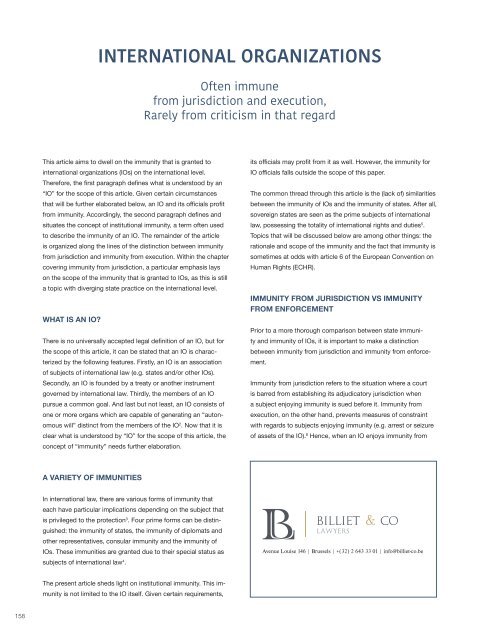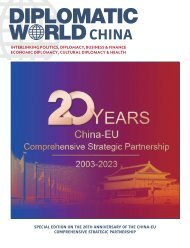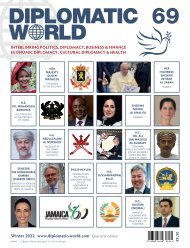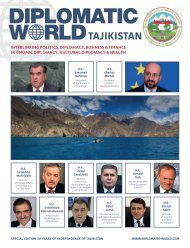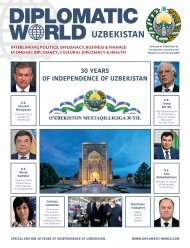Diplomatic World 67
You also want an ePaper? Increase the reach of your titles
YUMPU automatically turns print PDFs into web optimized ePapers that Google loves.
This article aims to dwell on the immunity that is granted to<br />
international organizations (IOs) on the international level.<br />
Therefore, the first paragraph defines what is understood by an<br />
“IO” for the scope of this article. Given certain circumstances<br />
that will be further elaborated below, an IO and its officials profit<br />
from immunity. Accordingly, the second paragraph defines and<br />
situates the concept of institutional immunity, a term often used<br />
to describe the immunity of an IO. The remainder of the article<br />
is organized along the lines of the distinction between immunity<br />
from jurisdiction and immunity from execution. Within the chapter<br />
covering immunity from jurisdiction, a particular emphasis lays<br />
on the scope of the immunity that is granted to IOs, as this is still<br />
a topic with diverging state practice on the international level.<br />
WHAT IS AN IO?<br />
There is no universally accepted legal definition of an IO, but for<br />
the scope of this article, it can be stated that an IO is characterized<br />
by the following features. Firstly, an IO is an association<br />
of subjects of international law (e.g. states and/or other IOs).<br />
Secondly, an IO is founded by a treaty or another instrument<br />
governed by international law. Thirdly, the members of an IO<br />
pursue a common goal. And last but not least, an IO consists of<br />
one or more organs which are capable of generating an “autonomous<br />
will” distinct from the members of the IO 2 . Now that it is<br />
clear what is understood by “IO” for the scope of this article, the<br />
concept of “immunity” needs further elaboration.<br />
A VARIETY OF IMMUNITIES<br />
In international law, there are various forms of immunity that<br />
each have particular implications depending on the subject that<br />
is privileged to the protection 3 . Four prime forms can be distinguished:<br />
the immunity of states, the immunity of diplomats and<br />
other representatives, consular immunity and the immunity of<br />
IOs. These immunities are granted due to their special status as<br />
subjects of international law 4 .<br />
INTERNATIONAL ORGANIZATIONS<br />
The present article sheds light on institutional immunity. This immunity<br />
is not limited to the IO itself. Given certain requirements,<br />
Often immune<br />
from jurisdiction and execution,<br />
Rarely from criticism in that regard<br />
LEGAL SERVICES FOR DIPLOMACY<br />
its officials may profit from it as well. However, the immunity for<br />
IO officials falls outside the scope of this paper.<br />
Billiet & Co lawyers advices and represents States, International Organizations and their<br />
diplomatic missions in Brussels — as well as members of their staff, international civil servants,<br />
government officials, leading multinational corporations and non-governmental organizations.<br />
The common thread through this article is the (lack of) similarities<br />
between the immunity of IOs and the immunity of states. After all,<br />
sovereign states are seen as the prime subjects of international<br />
law, possessing the totality of international rights and duties 5 .<br />
We understand that you require unique and sensitive services, and we are uniquely placed<br />
to provide them, in a range of languages such as English, Dutch, French, Russian, German,<br />
Spanish, Greek, Ukrainian, and Romanian.<br />
Topics that will be discussed below are among other things: the<br />
rationale and scope of the immunity and the fact that immunity is<br />
sometimes at odds with article 6 of the European Convention on<br />
Human Rights (ECHR).<br />
at protecting the IO from interference of the state where its headquarters<br />
are situated or where the IO is operating. 10<br />
The firm has wide experience in legal issues surrounding Seat Agreements, Rights and<br />
Obligations of the guest mission and its hosting State, Investor-State disputes, Inter-State<br />
IMMUNITY disputes and FROM all kinds JURISDICTION of legal questions VS IMMUNITY involving International Organizations. We represent Institutional immunity thus serves another rationale than state<br />
FROM clients ENFORCEMENT<br />
before national and international courts and arbitral tribunals.<br />
immunity, as state immunity is rather based on the principle of<br />
sovereign equality. 11 This principle of sovereign equality is also<br />
Prior to a more thorough comparison between state immunity<br />
and OUR immunity LEGAL of IOs, SERVICES it is important FOR to make DIPLOMACY a distinction<br />
between immunity from jurisdiction and immunity from enforcement.<br />
Legal compliance with Belgian, European, International laws and regulations<br />
<strong>Diplomatic</strong> immunity / Consular support<br />
Public International Law / EU Law<br />
Immunity Trade and from WTO jurisdiction law, treaty refers interpretation to the situation and trade where negotiations a court<br />
is barred International from establishing Arbitration and its adjudicatory Dispute Resolution jurisdiction when<br />
a subject Enforcing enjoying International immunity Arbitral is sued Awards before in Belgian it. Immunity Courtsfrom<br />
execution, Enforcement on the proceedings other hand, against prevents State entities measures of constraint<br />
Sanctions law and Export controls<br />
with regards to subjects enjoying immunity (e.g. arrest or seizure<br />
Global fraud and Asset Recovery<br />
of assets of the IO). 6 Hence, when an IO enjoys immunity from<br />
Foreign Direct Investment in Belgium, EU, Russia and CIS countries<br />
International Employment and Labour law<br />
Immigration and International Mobility<br />
Avenue Louise 146 | Brussels | +(32) 2 643 33 01 | info@billiet-co.be<br />
jurisdiction, it will enjoy immunity from execution as well. When<br />
an IO does not enjoy immunity from jurisdiction, it may still profit<br />
from immunity from execution 7 .<br />
IMMUNITY FROM JURISDICTION<br />
RATIONALE<br />
In 1944, McKinnon Wood stated that IOs need immunity because<br />
of: “the danger of prejudice or bad faith in national courts, the<br />
need of protection against baseless actions brought from improper<br />
motives, and the undesirability of national courts determining<br />
the legal effects of acts of the organization, possibly in<br />
diverging directions”. 8<br />
Institutional immunity is generally founded on the principle of<br />
functional necessity. It is deemed necessary for the IO in order to<br />
be able to perform its functions in an effective and independent<br />
manner. 9 After all, as opposed to a sovereign state, an IO cannot<br />
rely on its own territory or population in order to ensure its proper<br />
functioning. The immunity for IOs thus aims, among other things,<br />
reflected in the adage “par in parem non habet imperium”, which<br />
means that a state is not subject to the jurisdiction of another<br />
state. 12 While sovereign states are thus formally equal in international<br />
law, IOs are formally different. The principle of functional<br />
necessity then guarantees that they will be immune as well, when<br />
operating their various functions. 13<br />
IMMUNITY FROM JURISDICTION<br />
LEGAL BASIS OF THE IMMUNITY<br />
Institutional immunity usually originates in the constituent instrument<br />
of IOs (e.g. article 105 UN Charter). As the constituent instrument<br />
of IOs generally remains on the surface with regards to<br />
the immunity of the IO and its officials, these general provisions<br />
KEY CONTACTS are often complemented by a specialized treaty on the immunity<br />
of the IO and its officials. Members that prefer staying out of<br />
Johan Billiet<br />
these multilateral treaties, may discuss a bilateral treaty with the<br />
johan.billiet@billiet-co.be<br />
IO as well, i.e. a headquarters or host agreement. 14<br />
Dr. Konstantinos Adamantopoulos<br />
konstantinos.adamantopoulos@billiet-co.be<br />
Philippe Billiet<br />
Some states transpose these international agreements to national<br />
law. Others prefer to adopt autonomous legislation without re-<br />
philippe.billiet@billiet-co.be<br />
Vladimir Lincautan<br />
ferring to the existing international agreements. 15 An example of<br />
vladimir.lincautan@billiet-co.be the latter is the International Organizations Immunities Act (IOIA)<br />
in the US. The IOIA regulates, inter alia, the immunity of the UN.<br />
As the US refused to become a party to the multilateral treaty of<br />
the UN related to immunity for IOs at the time, the importance of<br />
this national legislation is not to be underestimated. 16<br />
Whether immunity for IOs can be deducted from customary<br />
international law or general principles of law, is still disputed.<br />
This question arises e.g. in the absence of an applicable treaty<br />
provision. 17<br />
IMMUNITY FROM JURISDICTION<br />
SCOPE OF THE IMMUNITY<br />
The main issue concerning the immunity from jurisdiction for IOs<br />
relates to the scope of this immunity. Central to the debate is the<br />
question on whether IOs should be granted restricted or absolute<br />
immunity. As the US’ viewpoint shows below, a comparison<br />
between state and institutional immunity is insurmountable on<br />
this point.<br />
The US issued the IOIA in 1945. This Act grants IOs “the same<br />
immunity from suit and every form of judicial process as is enjoyed<br />
by foreign governments”. 18 As sovereign immunity was still<br />
absolute at the time, this act meant that IOs enjoyed the same<br />
absolute immunity in the US. 19<br />
However, the Foreign Sovereign Immunities Act of 1976 (FSIA)<br />
limited the immunity of foreign governments to “acta iure imperii”<br />
which refer to sovereign acts of the government. These acts<br />
need to be distinguished from “acta iure gestionis” which refer<br />
to acts of the government that are of a commercial or private<br />
nature. 20 By only referring to foreign governments, and thus not<br />
explicitely mentioning IOs, the FSIA resulted in 2 conflicting lines<br />
of precedent. 21 On the one hand, some argued that the FSIA<br />
introduced restricted immunity, not only with regards to states,<br />
but to IOs as well. On the other hand, some stated that IOs continued<br />
to enjoy absolute immunity, regardless of the FSIA. While<br />
foreign governments thus only would enjoy a restricted immunity<br />
from the FSIA onwards, IOs would still fall within the scope of the<br />
unchanged IOIA, which granted them absolute immunity.<br />
This conflict was eventually settled by the US Supreme Court<br />
in 2019, where the Court decided that the FSIA also applies to<br />
IOs and IOs are thus subject to the same restricted immunity as<br />
foreign governments. 22<br />
The tendency to put IOs on equal footing with states when it<br />
comes to immunity, is not universally accepted. 23 In fact, the US<br />
seems to stand alone in this regard. While immunity of IOs is<br />
always described as functional, it is often stated that it de facto<br />
boils down to absolute immunity, as opposed to state immunity. 24<br />
Of course, exceptions to this rather absolute immunity of IOs do<br />
exist, but they have to be expressly provided for in the international<br />
agreements granting the immunity. 25<br />
158 159<br />
AD-BillietCo.indd 2 28/07/2020 15:16


